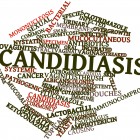
Do You Have Candida?
Thought to affect more than 40 million Americans, Candida albicans is recognized as a complex syndrome known as chronic candidiasis or yeast syndrome. These tiny organisms attach themselves to the intestinal wall where they compete with cells and ultimately the entire body for nutrients, thus creating nutrient deficiencies. This overgrowth of yeast is believed to cause widespread symptoms in virtually every system of the body, with the gastrointestinal, genitourinary, endocrine, nervous, and immune systems being the most susceptible.
If your immune system stays strong, the yeasts will not cause problems. However, when you take antibiotics for infections, the drugs will kill off the friendly gut bacteria and then the opportunistic yeast can take over. Other contributing factors include: oral corticosteroids, cancer treatments chemotherapy and radiation, diabetes, and a weakened immune system.
A diet rich in sugar and other simple carbohydrates promotes yeast overgrowth. And sugar and foods that turn to sugar quickly such as white flour, white rice, and processed foods are the yeasts foods of choice. As the yeast population increases, they can cause overwhelming urges to eat sweets, starchy foods, or simple carbs such as white flour products. That is why it is imperative that you get sugar and foods that turn to sugar easily out of your diet. You want to starve these little critters. Sweets can actually cause candidiasis, even if you haven’t taken antibiotics. I’m convinced that happened to me. In my twenties I had a very bad case of yeast overgrowth, but I had not taken antibiotics in childhood or as a young adult. Candidiasis may have developed because sugar is very acidic. When your body’s pH is out of balance, candida can take over creating a systemic problem.
Also, take note if you have IBS, Crohn’s, or Gastroenteritis. When people who are diagnosed with IBS, Crohn’s Disease, or Gastroenteritis, are prescribed Cortisone for inflammation, the steroids in the gut can increase the growth of Candida albicans.
Some of the symptoms of yeast overgrowth include:
- Depression
- Inability to focus
- Poor memory
- Foggy brain
- Irritable
- Angry outbursts
- Dizziness
- Crying spells
- Low libido
- Recurring yeast infections
- Cravings for sweets
- Cravings for alcohol (beer, wine, or hard liquor)
- Insomnia,
- Fatigue
- Allergies
- Frequent colds and flu
- Acid reflux
- Bloating/faltulence
- Burping after a meal
- Mucous in the stools
- Itchy anus
- White coat on the tone
- Bleeding gums
- Itchy eyes
- Bags under the eyes
- Ringing in the ears
- Frequent ear infections
- Persistent cough
- Sinus infections
- Difficult to lose weight
- Water retention
- Headaches
- Heart palpitations
- Autism
- ADD/ADHD
What can you do if you suspect you may have candidiasis? You could get a stool test. But if you just want to jump right in to conquer this problem and deal with symptoms, the program to get rid of yeast can only help improve your health. First you’ve got to knockout sugar and simple carbs – Get The Juice Lady’s Sugar Knockout. I also recommend that you join my 10 Step Sugar Detox group. And get the products to help get yeast under control. See my recommendations for Yeast Control Products.










my fingernails are pulling away from the quick. they are back 1/4 of an inch on some nails could that be candida?
Debby, It could be that the yeast/fungus is affecting your nails. Do you have any of the other symptoms of yeast overgrowth listed in my newsletter today?